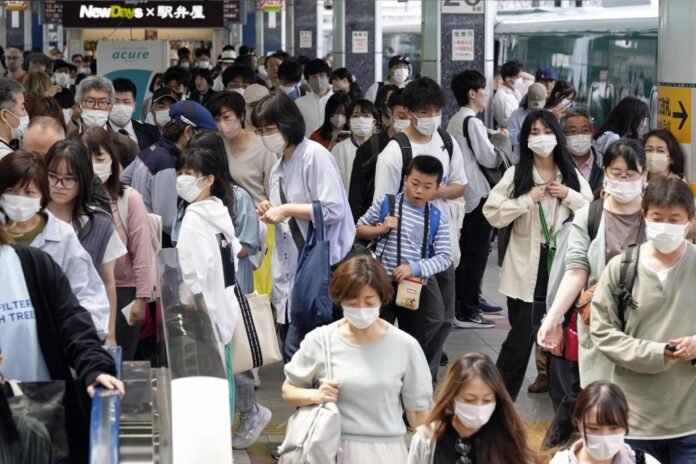Japan is currently grappling with a significant surge in flu cases, reaching levels not seen in the past decade. The rapid escalation of influenza infections has raised concerns about the potential impact on public health, especially when juxtaposed with the ongoing battle against the COVID-19 pandemic.
The flu outbreak has caught the attention of health authorities as cases are rising at an unprecedented pace. Hospitals and healthcare facilities are experiencing an influx of patients seeking treatment for flu-related symptoms, prompting a reevaluation of the country’s healthcare resources.
This surge in flu cases comes as Japan, like the rest of the world, is already contending with the challenges posed by the COVID-19 pandemic. The simultaneous occurrence of both flu and COVID-19 outbreaks has led to heightened concerns about the strain on healthcare infrastructure, potential co-infections, and the overall impact on the well-being of the population.
The rapid spread of the flu virus can be attributed to various factors, including increased social interactions, colder weather, and a potential waning of immunity due to pandemic-related restrictions over the past couple of years. The urgency of the situation has prompted health officials to advocate for preventive measures, such as flu vaccinations and adherence to hygiene protocols, to mitigate the impact of the flu outbreak.
While the focus is currently on the flu, the coexistence of flu and COVID-19 is a cause for considerable concern. The similarity in symptoms between the two illnesses poses diagnostic challenges, leading to the need for widespread testing to differentiate between influenza and COVID-19 cases. This dual public health challenge places a significant burden on testing facilities, requiring them to efficiently and accurately identify the nature of respiratory illnesses.
Japanese Government
The Japanese government has responded swiftly to the situation, ramping up efforts to increase the availability of flu vaccines and urging citizens to get vaccinated. The goal is to curb the spread of the flu, minimize severe cases, and reduce the burden on the healthcare system. Additionally, public awareness campaigns emphasizing the importance of flu vaccinations and preventive measures are being rolled out to educate and empower the population.
The simultaneous rise in flu cases and the persistent threat of COVID-19 have prompted a reassessment of Japan’s pandemic response strategy. The government is actively recalibrating its public health measures to address the evolving situation effectively. This includes refining testing strategies, bolstering healthcare capacity, and enhancing communication to keep the public informed about the risks and preventive measures associated with both flu and COVID-19.

As Japan navigates through this dual health crisis, international collaboration and knowledge-sharing become essential. The experiences and lessons learned in managing similar situations worldwide, especially in countries that have effectively mitigated the impact of both influenza and COVID-19, can offer valuable insights for Japan’s healthcare authorities.
The emergence of a significant flu outbreak amid the ongoing battle against COVID-19 underscores the unpredictable nature of public health challenges. It serves as a stark reminder of the importance of robust healthcare infrastructure, proactive vaccination campaigns, and adaptable response strategies to effectively tackle unforeseen health crises.
Japan’s current surge in flu cases at the fastest pace in a decade poses a multifaceted challenge, intensified by the coexistence of the ongoing COVID-19 pandemic. The proactive response from health authorities, coupled with increased vaccination efforts and public awareness campaigns, will play a pivotal role in mitigating the impact of the flu outbreak while concurrently managing the persistent threat of COVID-19. The situation emphasizes the need for continual adaptation and collaboration on a global scale to address the complexities of dual health crises.
The confluence of the flu outbreak and the ongoing COVID-19 pandemic highlights the importance of a comprehensive and integrated healthcare approach. Efforts to control the flu should not undermine the critical measures in place to combat the coronavirus. Balancing the response to both respiratory illnesses requires a delicate coordination of resources, from testing capacities to medical supplies and personnel.
Public cooperation is paramount in the success of these efforts. Citizens are urged to adhere to health guidelines, practice good hygiene, and promptly seek medical attention if they experience symptoms associated with either the flu or COVID-19. The responsibility falls not only on the healthcare system but also on individuals to contribute to the collective well-being of society.
The economic implications of a dual health crisis also come into play. The strain on the healthcare system, coupled with potential workforce disruptions due to illness, can impact productivity and economic stability. Governments and businesses must collaborate on strategies to support affected individuals, ensure workplace safety, and navigate the economic challenges posed by these unforeseen health crises.



